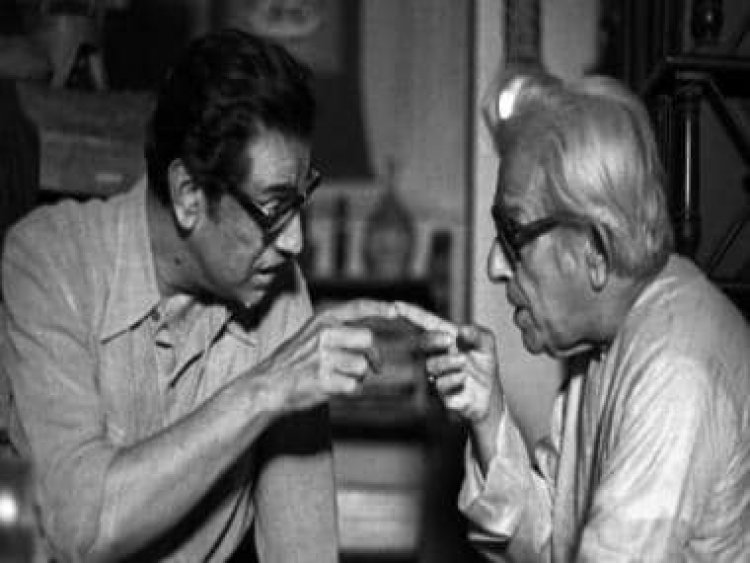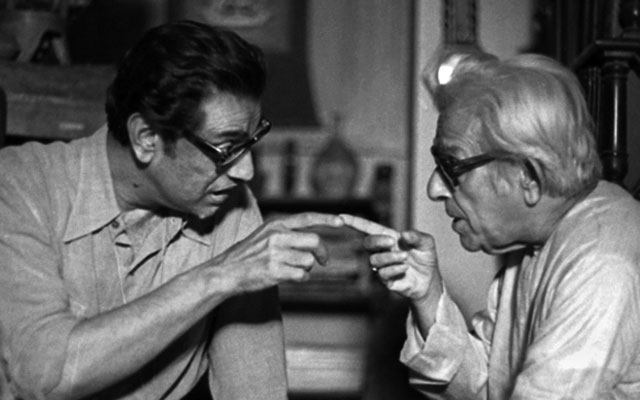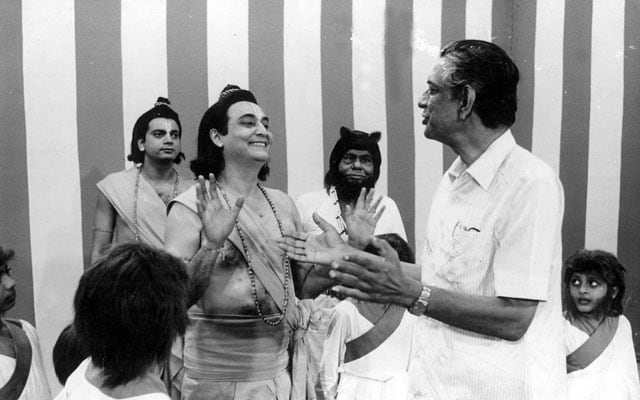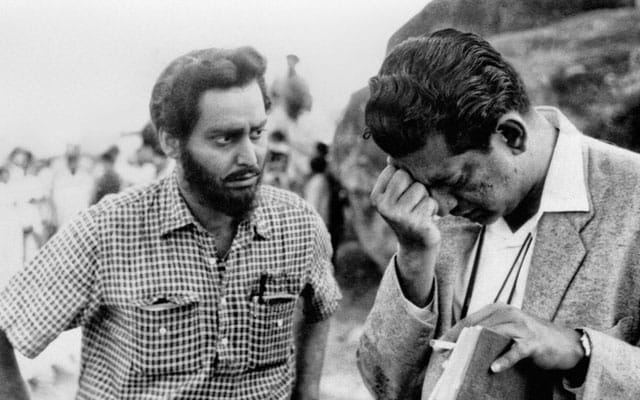Ray-esque | How Satyajit Ray's son believes that his father would have been a fantastic actor
Ray-esque | How Satyajit Ray's son believes that his father would have been a fantastic actor

It’s no exaggeration that filmmaker Satyajit Ray could have turned out an outstanding actor too. This was evident to those who have been lucky to be present on the sidelines of his sets while the master shot his films. This writer must confess that he has been extremely fortunate to watch Ray shooting from the days of Chiriakhana (The Menagerie). Not the shooting of every Ray film maybe, because I was very young and had to also attend school.
Well, my mother took me along to the shooting of Chiriakhana in Barasat where Ray had fashioned the sets of Golap Colony (Rose Colony) in 1966. This writer was nine years of age then. Later, of course, one has viewed many a Ray shooting where, amongst other facets, the same experience was repeated in varying degrees depending on the sensibilities of the actors. Of the maestro rehearsing the roles, either overtly or through modulating his voice while reading out the script. Of course, a script-reading session ensued at Satyajit Ray’s home in the run-up to a film. It must be added here that Ray was always open to improvisations by the actor if it added value to a shot.

I had dropped by at the shooting of Agantuk (The Stranger), the master’s last film for a month at a stretch, working on a feature piece for a leading daily in tandem. Having been present till the last shot of Agantuk, I was witness to Satyajit Ray’s acting prowess palpably. This despite some critical restrictions placed by doctors on the virtuosic film director because of his fragile cardiac condition. Ray’s acting out a passage from the screenplay of Greek philosophers, scientists and mathematicians interacting with each other aeons ago, to famed actor Utpal Dutt, is unforgettable. Anyone who has witnessed that sequence as enacted by the master will unhesitatingly bracket Ray as a film maker who was also endowed with superb acting talents.

Says Sandip, Satyajit Ray’s son, “I can’t obviously narrate comprehensively from the beginning. But based on what I have heard, Uma Dasgupta who played Durga in Pather Panchali didn’t need too much tutoring. She was very intelligent. Once she was explained the manner in which a shot would go, she latched on extremely quickly. But, Subirda (Banerjee), had to be guided by father when a shot was in progress. But, I can clearly recall father’s entire process of film making from when I grew up and began attending father’s shootings. Father would first write the screenplay and when he was fully satisfied, he would come up with a final copy. In turn, a script-reading session would transpire with the actors in father’s study. His core artistes would be present during this sort of a workshop.
“Father would begin this session between nine and ten in the morning. It would continue for some time, after which there was a break. Then, it began again and was finally wrapped up. Once father was through with the screenplay, he would enter into discussions with the actors who were present. But, what is interesting is that while reading the script, father would act out all the dialogues to the actors.” In fact, lead actors like Soumitra Chatterjee and Rabi Ghosh had frankly expressed to Sandip that if one keenly followed Manikda’s, (the way they addressed Ray), dialogue rendition, you knew perfectly well the approach to act out a role.

“And, father would act out each character differently. For instance, If it was a Feluda (Ray’s literary detective) film, he kept spontaneously improvising between Feluda’s dialogues and Lalmohanbabu’s (Feluda and his cousin’s writer-friend). This was quite incredible. This happened with every film. It was incredible. The actors told me that father’s script reading was a major homework for them. Anyone who followed father intently, wouldn’t be required to ask too many questions later, except the odd one. Of course, sometimes, an actor failed to render a dialogue or act exactly how father had expected. I used to occasionally ask him why he had okayed a shot despite an actor falling short of father’s directorial touch. He explained to me that these minor aberrations could be handled and corrected at the editing table,” enlightens Sandip.
He goes on to talk about his great father’s inexplicable equation with his child artistes “right from Day One”. The master’s working up this relationship with children who performed in his films is amazing. It’s difficult to imagine a person as tall as him with a baritone voice building up such wonderful ties with children on the floors of a set or even outdoors as in Pather Panchali or his other films. “And, he never pampered them. He treated them like adults. Even if a shot with a child artiste did not work as expected, he would still go ahead and exclaim it was ‘lovely’ or ‘terrific’ and go for another shot. He would constantly encourage them. It’s a pity that we didn’t film or create a lengthy video footage of father acting out roles to different actors. That would have remained as a fantastic goldmine,” emphasises Sandip.

Sandip goes on to specifically cite a shot at the outset of Shakha Proshaka (Branches of a Tree). “Father had acted out an entire sequence for Ajitda (Banerjee) in the opening shot between Soumitrakaku (Chatterjee) and Ajitda. I regret very much not documenting my father’s extraordinary act. It’s another matter, of course, that father may have become conscious if I embarked on such an exercise. It was impeccable, timing-wise. Father had spanned the dialogue perfectly sprinkling it with the correct pauses. I deeply regret not recording these stretches of his directorial flourish. This probably wouldn’t have happened had it been overseas.” They would have recorded this tremendous directorial act by father,” rues Sandip visibly. “This is still crystal clear in my mind. And, I must add that such performances, if I may describe them as such, by my father as an actor were brought off in several films that he created. While acting out roles to many actors, he allowed liberties to those with whom he developed a confidence level. He would tell them to play the role first and correct them in sections if called for. I remember father was very confident about Dhritida (Dhritiman Chatterjee) delivering the character of Siddharta to the tee in Pratidwandi (The Adversary) after conversing with him while finalising the cast for the film. Father would correct the dialogue delivery or acting of deft actors only if necessary.”
“Such instances are multifarious,” says Sandip. “That reasons why, maybe even a hugely gifted actor like Utpalda (Dutt) had expressed to father that he probably couldn’t make father as happy as Manomohan Mitra in Agantuk. Father had acted out fair stretches of Barunda’s (Chanda) role in Seemabadha (Company Limited). At the same time, he virtually didn’t have to act out anything to Paramitadi (Biswas) despite Seemabaddha being her first (and last) film. Her’s was a fabulous performance. Extremely natural and normal. Just what father was looking for. With Rinkudi (Sharmila Tagore), of course, father had worked up an indescribable chemistry over the years. So, she always came up with a performance that father had in mind.
“In the initial stages of Jana Aranya (The Middleman), father tutored Pradipda (Mukhopadhyay) a good deal. Of course, he followed everything that father was conveying or showing to him. In the latter part of Jana Aranya, father also allowed Pradipda liberties and then put him on track if necessary,” says Sandip with frankness.
Even a great actor like Rabi Ghosh, who was also a favourite of the maestro, got his act wrong on the first day of Jana Aranya’s shooting, according to Sandip. In fact, Satyajit Ray packed up shooting earlier than he did normally, returned home and wondered aloud to mother whether he was mistaken in casting Rabi Ghosh as Natabar Mitter in the film. “Just as father was airing this thought to mother, the phone rang. It was Rabikaku (Rabi Uncle) on the other end. He apologised to father for failing to gratify him with his performance on the first day. He requested father to explain the essence of his character once more. Father verbally acted out just a few lines and summarised the character of Natabar Mitter to Rabikaku. That’s just it. It was a transformed Rabi Ghosh on the sets the next day. That was Rabi Ghosh,” exclaims Sandip.

A great deal of shots were manouevered on the editing table so that the cream of performances by the actors remained and came to the fore in a particular film. Sometimes, father would go for three or four ‘takes’ in the film and juxtapose the best portions on the editing table.
“We were all witness to father going about his business in this manner while editing. But, even before shooting took off on a particular morning, father would read out the script again to his actors, verbally acting out the scene. The intelligent actors immediately got a feel of what the director was looking for,” explains Sandip. “I have never ever experienced father losing his cool or temper if an actor was slipping on his performance despite multiple ‘takes’. He would simply ‘pack up’ as far as that actor went and resume afresh with him or her the next day. If he or she was quick in realising the import of father ‘packing up’ earlier than normal, then the actor would work harder the following morning to deliver. An interesting looking character during a screen test could have been a ham actor. However, that’s not to say that father hasn’t faced such a hurdle with his seasoned actors. He has experienced such a hiccup occasionally even with some of his favourite actors. But, he never curtailed his day’s shooting schedule even if he was done with an actor for the day. He would finish off nitty gritty like reaction ‘takes’ and shoot till six in the evening and finally pack up. His was always a ten in the morning to six in the evening shooting schedule,” Sandip underscores.
This writer recalls, at this point, Satyajit Ray shooting Shatranj Ke Khilari (The Chess Players) at Indrapuri Studio, Tollygunge (in south Calcutta). This is the scene where Wajid Ali Shah (incomparably played by late Amjad Khan) has to abdicate his throne. The great Satyajit Ray had asked Amjad to “caress” the hand rest of the throne. And, Amjad brought it off with aplomb. The subtlety is, of course, encased in the word ‘caress’. The rest is left for readers to fathom.
In the event of the odd shabby performance by an actor (not centering on the major characters), despite the master acting out the role to him or her, and even failing to correct it in the dubbing room, Sandip says that his father would simply do away with the footage during editing. “It has happened on severaI occasions. I also deeply regret not having preserved these edited footages to this day. Today, these footages spliced together would have not only made for extremely interesting viewing, but would have been precious,”
Sandip exudes. “Which is truly unfortunate. These could have been included in the ‘behind the scenes section’ with a certain film. Footages showing father’s acting out a sequence surface sometimes in the documentaries made on him. But, that’s hardly anything given the stretch of his directorial career. Father’s commentary in the documentary on Rabindranath would not have come through, as it did, had father not possessed the gift of an actor. In the war sequence, father’s voice lent a pathos which is extremely moving. In the documentary on Sukumar Ray, he avoided the voice-over and let Soumitrakaku (Soumitra Uncle) do the talking because it was an essay on his father. But, father’s voice, with perfect balance and modulation, will remain for posterity in the documentaries Inner Eye on artist and father’s mentor in Kala Bhavan, Benode Behari Mukhopadhyay, and Bala hovering around danceuse Bala Sarwasati.”
Sandip goes on to make a special mention of Hirak Rajar Deshe’s script reading. “The script was replete with verse and songs. So, father not only was reciting the dialogues of each character, he sang the songs. When the script-reading session was over, Soumitrakaku expressed it was an ‘inspired screenplay’. Different scripts were rendered in varying styles. Today, when I sit back and think about not documenting these outstanding moments, I feel I had taken father for granted as someone who was sitting and working just adjacent to my room.

“Actually, it is remarkable that together with handling so many departments of filmmaking, he also acted out roles to his actors. It’s extraordinary and unique. Of course, those who had acted with him for a long while, were attuned to father’s requirements. So, father wouldn’t push beyond acting it all out during script reading to those who were accustomed. This is especially how I saw him during his last three films when he was not well. Agantuk (The Stranger) may have been a departure to an extent, because in that film he had viewed Utpalda as his spokesman. Besides, Utpalda was also not keeping pristine health. But, father had expressed after the film that none but Utpal Dutt would have succeeded in pulling off that character. Undoubtedly, had father taken up acting as a profession, he would have overshadowed many in their business,” says Sandip without batting his eyelid.
Satyajit Ray, the supreme actor, will forever remain unsung.
All images from Satyajit Ray Society.
Ashoke Nag is a veteran writer on art and culture with a special interest in legendary filmmaker Satyajit Ray.
Read all the Latest News, Trending News, Cricket News, Bollywood News, India News and Entertainment News here. Follow us on Facebook, Twitter and Instagram.
What's Your Reaction?

























































